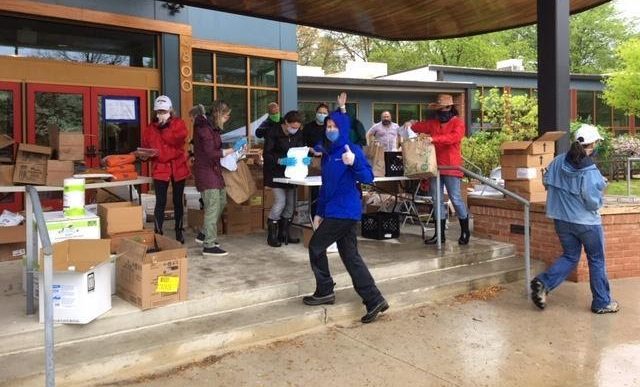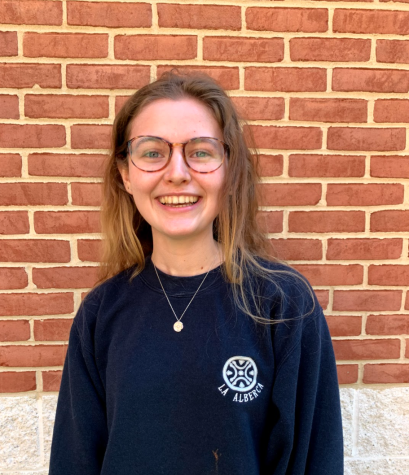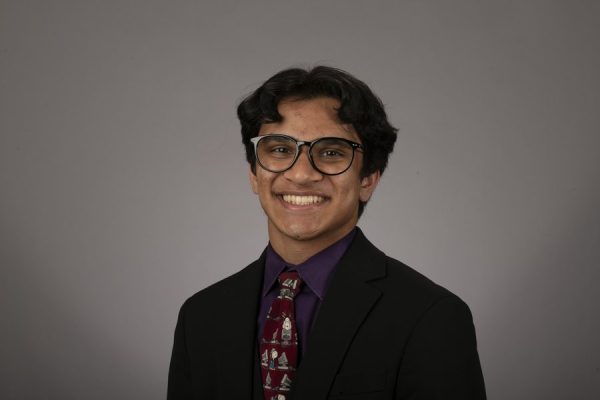Food delivery services support local businesses, communities during pandemic
Photo Courtesy of Lisa Esquevil-Owen
Glen Echo Heights Citizens Association volunteers prepare food orders for delivery.
June 19, 2020
It’s delivery day. Glen Echo Heights Citizens’ Association President Lisa Esquevil-Owen surveys the array of cardboard boxes and coolers filled with fruits, vegetables and packages of meat that line the Washington Waldorf School’s entrance. She’s been up since 7 a.m., is on her second cup of coffee, and has a long morning ahead of her as she and a few other volunteers work to complete food orders.
As a result of the coronavirus pandemic and Governor Larry Hogan’s stay-at-home order, many restaurants in Montgomery County have faced a downturn in business and until recently have had to rely solely on takeout orders. Shortages of staple items have also forced residents in the county to find and create different means of meeting their food needs. Community-organized food delivery systems like Esquevil-Owen’s have served as a popular alternative for quarantined citizens and have helped support struggling businesses.
Using a web form posted on the GEHCA Listserv, customers place their orders by selecting from a list of the week’s available food. Around every two weeks, delivery day comes. Volunteers match up food orders and carry them to their customers’ cars, making sure to space out customer pick-up times and wear gloves and masks for safety.
The food service began when Esquevil-Owen’s neighbor connected her to Terry Mahoney, a sales representative for local wholesale food distributor Saval Foods.
“He told me that Saval’s contracts had effectively been cut in half,” Esquevil-Owen said. “A multitude of workers were on the brink of losing their jobs and [the ability to] provide for their families.”
Esquevil-Owen proposed that GEHCA act as a middleman between Saval Foods and the public. Given the organization’s non-profit designation, Esquevil-Owen also suggested that five percent of the profits be donated to support COVID-19 relief.
Since its first delivery on March 24, GEHCA has accounted for the sale of over $52,000 worth of Saval food to Bethesda residents. A portion of that money has paid for personal protective equipment, food supplies and dollar donations for local institutions including Suburban Hospital, the Montgomery County Police Department and Glen Echo Park.
Bannockburn Pool President Tanya Sisler has also set up a system to help consumers and local businesses: food trucks come to the Bannockburn Pool regularly, following a schedule available online.
“I was reading a lot about how many food businesses were struggling, and I know a lot of food trucks,” Sisler said. “I thought it would be a win-win. I thought bringing [customers] to the pool is psychologically less scary than going to a restaurant.”
The first to come was the Cipolla Rossa Pizzeria food truck, which, according to the pizzeria’s owner, Josh Ansen, had lost a lot of business due to quarantine. Coming to the pool every two weeks has helped it to recover.
“I was definitely worried because all of our catering was canceled and all of our venues were closed,” Ansen said. “Tanya is humble about it, but she’s done a lot for us — more so than any other neighbors.”
These services have not only supported residents and businesses affected by COVID-19 and subsequent closures but have also given young people an opportunity to give back to their community. Junior Brielle Ohana has been acting as the social media manager for Bannockburn Pool’s food truck roster after her summer plans fell through due to the pandemic.
“I reached out to Tanya just to help because I’ve always been into marketing and outreach,” Ohana said. “I just wanted to be able to help the community in some way because so many small businesses are struggling.”
Natalie Parsons, a graduate from The Madeira School in McLean, Virginia, has been volunteering for the last couple of months with the Waldorf GEHCA delivery service. Since the pandemic forced her school to send students home, Parsons has been looking for a way to occupy her time.
“It’s very easy to say, ‘I’m just going to stay at home and weather out the storm, and it’s going to be okay,’” Parsons said. “But what I learned is to immediately ask yourself, ‘What can I do to help others?’, [which] makes the experience of such a challenging event like a pandemic that much more bearable. It helps you understand that sense of community you have next to you.”
As the community grows more comfortable with these programs and adjusts to a new normal, Sisler has hope they will continue to exist in the future.
“This is the beginning of a nice tradition,” Sisler said. “I’ve intentionally marketed and advertised extremely widely outside the community, so people feel comfortable coming in — even non-pool members.”
Esquevil-Owen finds the pandemic has revealed the importance of unity in communities. She has come to know her neighbors on a deeper level, she said.
“I know they are sewists, healers, chefs, storytellers, holding the hand of sick loved ones, builders and guardians,” Esquevil-Owen said. “I have learned that communities must always create spaces for people to be real, so in times like these, we can turn to each other and lift or lean.”







